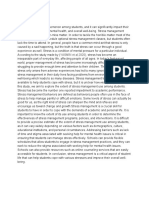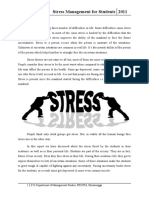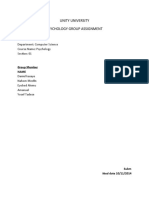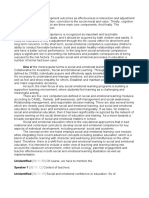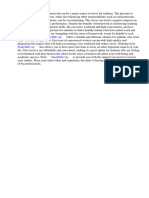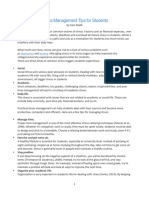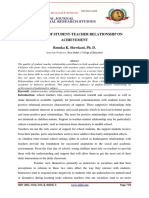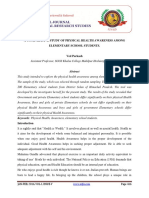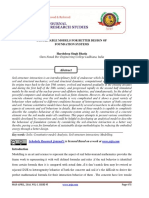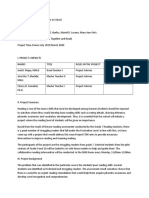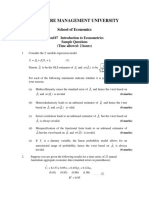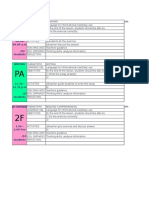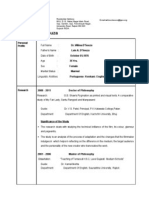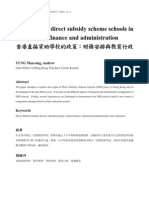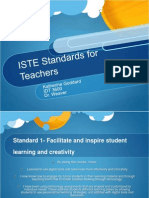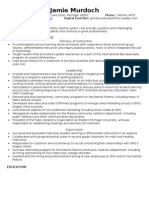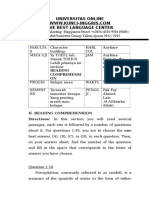Emerging Trends in Teacher Education Shri. Ingale Ganesh Popat
Emerging Trends in Teacher Education Shri. Ingale Ganesh Popat
Copyright:
Available Formats
Emerging Trends in Teacher Education Shri. Ingale Ganesh Popat
Emerging Trends in Teacher Education Shri. Ingale Ganesh Popat
Original Title
Copyright
Available Formats
Share this document
Did you find this document useful?
Is this content inappropriate?
Copyright:
Available Formats
Emerging Trends in Teacher Education Shri. Ingale Ganesh Popat
Emerging Trends in Teacher Education Shri. Ingale Ganesh Popat
Copyright:
Available Formats
IJERS/ BIMONTHLY/SHRI INGALE GANESH POPAT (391-396)
EMERGING TRENDS IN TEACHER EDUCATION
Shri. Ingale Ganesh Popat
Aryan C.B.S.E.School & Junior College, Musalwadi Tal-Rahuri Dist-Ahmednagar Maharashtra.
Abstract
Stress or tension, has become an integral part of student life. A little bit of stress may be
unavoidable and good too, for it would never allow us to be complacent in life. But too much of
stress may be counterproductive and would in due course impair both our physical and mental
health. And such stress stalks all the age-groups including the children and the youth. Education
should be a joyous experience, but if too much pressure is put into it, children find the going a
hard nut to crack. Too much of home work, home work during the long summer vacations and
the tedious examination system, all have made both the wards and their parents edgy. There are
hundreds of cases of youngsters taking their lives when they fail in the examination. Failure in
an examination is not the end of the life. One can excel in any field if one chooses the right field
for which one has the aptitude. It is the duty of parents, the schools, the colleges, the universities
and the educational authorities to make education stress-free. They have to reorient education
with the child or the youth as the centre, removing all the obstacles that come in the way of the
development of an integrated personality. To a large extent, a part of the stress can be eased by
promoting a harmonious relationship between the parents on one hand the children on the other
and also between the wards and the educational institutions. The parents should take an
immense interest in what their child learns at the school and should do their best in attending the
periodical parent- teacher meetings. All efforts should be made to sustain the trilateral
interaction among the three-the student, the teacher and the parents.
Emerging trends in stress free education
Nowadays stress is a common factor for all of us. Everyone wants a stress-free lifestyle. Stress is
the major culprit for dozen aches and pains, and we always work towards its elimination.
Students also face this problem but they are able to overcome that problem. Stress is a factor,
which if managed properly then there is no effect of it on the human mind. Stress reduces the
strength of human to do work. Nowadays there are various classes for stress management. But
thinkers think that as we include the stress management in the syllabus at secondary stage of
JAN-FEB, 2016, VOL-I, ISSUE-V
www.srjis.com
Page 391
IJERS/ BIMONTHLY/SHRI INGALE GANESH POPAT (391-396)
education then we can easily manage this issue properly. To overcome all those issues some
emerging trends are needed in education which can as follows,
1. Yoga education
2. SWOT analysis
3. Meditation
4. Multi class theory
5. Programs related to good mental health
6. Programmed learning
7. Duration for qualifying exam
8. Job guarantee
9. Use of animations
10. Duration of periods
11. Confidence generating programs
12. Spiritual stories
13. Adolescence
14. Learning by doing
15. Nurture
16. Multidisciplinary approach
17. Value education
18. Informal education
19. Teaching methods
20. Simple education
21. Open book exam
22. Structure of school
23. Sports activity
24. Practices
25. Guidance and counseling from parents
Yoga education:
Yoga education plays vital role to live stress free life. Yoga is the ancient art of our
country. It tells us to how to concentrate on object and how to overcome on different problems.
The main slogan of yoga is Sound mind in a sound body. By the use of yoga we can easily
JAN-FEB, 2016, VOL-I, ISSUE-V
www.srjis.com
Page 392
IJERS/ BIMONTHLY/SHRI INGALE GANESH POPAT (391-396)
manage the stress. By the yoga education we can also overcome all body problems like various
diseases, mental problems like depression and stress etc. For all those issues yoga education is
very important to reduce them. By yoga we can provide stress free education to the students.
SWOT analysis:
S=Strength
W=Weakness
O=Options
T=Threats
As we know strengths in ourselves then we think how to use that in our work. It is also
very important to know our weaknesses because of that we cant go under depression. As we
know the options of jobs, education, business etc. that is also important to live stress free life.
We have different threats in life mainly related to education, jobs, family, friends etc. But as we
know the reality of all about that then we reduce the stress in life.
Meditation:
Meditation is the process where we forget all those things which give us stress. This is
very important to stress free life. When the childrens come in school and stand for prayer at that
time we use come time for meditation. By the meditation they concentrate on one thing and day
by day the power of concentration increases. As the power of concentration increases the stress
will reduce time to time. For all that reasons meditation is a better solution on the stress.
Multi class theory:
Multi class theory is a theory wherein students from different standards are made to sit in
a single class. Arrangement is made in such a way that on single table, students of different
classes sit together with not more than a single student from same standard. In such a case if any
student has some query or doubt then it can be resolved by his seniors, if any, from the same
table. Only in the case if the doubt is not solved, the students will approach the teacher. This will
help those students who hesitate to approach teachers when they are stuck with some problem
thereby reducing their stress and increasing there confidence.
Programs related to keep good mental health:
Nowadays to keep good mental health is very important for that we must conduct some
lectures from different thinkers, psychologists and successful persons from the society. In this
way we are successfully manage the stress free life of students.
JAN-FEB, 2016, VOL-I, ISSUE-V
www.srjis.com
Page 393
IJERS/ BIMONTHLY/SHRI INGALE GANESH POPAT (391-396)
Multidisciplinary approach:
Multidisciplinary approach is a kind of methodology wherein students will be given the
freedom to choose the subjects of their interest. This will result in the reduction of stress among
the students as they will be free from those subjects which they dont find interesting and need
not study them for examination purposes only.
Programmed learning:
Programmed learning means students learn by their own speed and they get the
confidence about the topic they learn. It plays a vital role to reduce the mental stress of the
students.
Use of animations and educational movies:
As the teacher use the animated clips to teach the students various concepts regarding
their subject then we can easily reach up to the students mind and educational movies are also
helpful for reducing stress. Movies like 3Idiots, 10F, Tare Zamen Par etc. help to reduce the
stress among the students.
Open book exam:
Open book exam is a type of exam wherein students are allowed to refer books while
solving exam papers. Such kind of exams would reduce the students tension and efforts of
memorizing difficult formulaes. It will also increase the confidence of the students thereby
reducing the exam fear.
Many of suicide attempts are during the period exams and results. As we conduct the open book
exam the students can overcome the examination stress.
Duration for qualifying exam:
Nowadays there is ATKT at primary and secondary level. But as we apply ATKT for that
level then students will not take stress of exam and education.
Duration of periods:
Quality matters a lot then quantity. Little but quality education is far better than improper
quantity education. Long and continues lectures are always boring and hence students do not
grasp completely and loose interest. Instead short but qualitative lecture which involves complete
involvement of the students are far better.
JAN-FEB, 2016, VOL-I, ISSUE-V
www.srjis.com
Page 394
IJERS/ BIMONTHLY/SHRI INGALE GANESH POPAT (391-396)
Personality development programs:
Personality development programs help to reduce the stress. By these programs we
increase the confidence level of students.
Spiritual stories:
Spiritual stories of different religions are included in the syllabus at different levels. By
those stories we provide confidence, truthfulness, humbleness, strength, power etc. By narrating
the stories like Ramayan, Mahabharat we can reduce the total stress.
Learning by doing:
As we learn something by doing that part will be set in our mind or that topic will last
long in our minds. So as we give experiences to the students then students understand better.
This will reduce the stress among the students.
Nurture:
Nurture plays fundamental role in stress management. But this factor totally depends on
the parents or guardians of the students.
Value education:
Value education provides the basic values to students. By using those values students low
down their stress levels.
Teaching methods:
We should use appropriate method for the content that we teach to the student. By the
correct teaching method student understands well and hence we reduce the stress factor among
the students.
Guidance and counseling from parents:
Teachers play an important role in any students life as they impart proper education to
the students. But apart from teachers, parents too play an equally important role by imparting
proper cultural and moral education to the students. Parents should always keep a watch on their
children and guide them regularly on right path.
Finally we can also reduce the stress level among the students by informal education, sports,
media etc.
JAN-FEB, 2016, VOL-I, ISSUE-V
www.srjis.com
Page 395
IJERS/ BIMONTHLY/SHRI INGALE GANESH POPAT (391-396)
References:
Educational psychology, by Dr. S. S. Mathur.
Multiple intelligence, by Armstrong T.
Personality motivation and action, by Atkinson J.
Motivation and personality, ed. II, by Maslow A.
Looking classroom, by Good T & Brophi J.
JAN-FEB, 2016, VOL-I, ISSUE-V
www.srjis.com
Page 396
You might also like
- Quickphonicsscreener Hasbrouck Parker 2001-1Document5 pagesQuickphonicsscreener Hasbrouck Parker 2001-1api-2522386820% (1)
- Essay 2 Final DraftDocument6 pagesEssay 2 Final DraftLenaMohanNo ratings yet
- Working TitleDocument3 pagesWorking TitleFrancine PerrerasNo ratings yet
- Introduction To My ResearchDocument6 pagesIntroduction To My ResearchJedidiah cristobalNo ratings yet
- 12.prof - Darandale J.B.Document4 pages12.prof - Darandale J.B.INTERNATIONAL JOURNAL FOR EDUCATIONAL RESEARCH STUDIESNo ratings yet
- Academic Stress Amongst Students:A Review of LiteratureDocument7 pagesAcademic Stress Amongst Students:A Review of LiteratureGEETA JAINNo ratings yet
- Stress Management Among Students Is A Hit or Miss Matter 1Document3 pagesStress Management Among Students Is A Hit or Miss Matter 1Jhon BerdulagaNo ratings yet
- Seminar On StressDocument24 pagesSeminar On StressPrithwish KotianNo ratings yet
- As a teacherDocument6 pagesAs a teacherFlora ChungNo ratings yet
- Aaron Beauchamp Fall2021 UT - TimetableDocument8 pagesAaron Beauchamp Fall2021 UT - TimetableAaron BeauchampNo ratings yet
- The Mindful Educator: Practices for Reducing Stress and BurnoutFrom EverandThe Mindful Educator: Practices for Reducing Stress and BurnoutNo ratings yet
- How To Cope With StressDocument3 pagesHow To Cope With StressHui YingNo ratings yet
- Critical Issues Paper: 1 GuitrauDocument11 pagesCritical Issues Paper: 1 Guitrauapi-534408850No ratings yet
- Background StudyDocument4 pagesBackground StudyErica Biares GaurinoNo ratings yet
- How To Cope With StressDocument2 pagesHow To Cope With Stresspower rangerdi l RenNo ratings yet
- Service Learning Project: Intermediate/SeniorDocument9 pagesService Learning Project: Intermediate/Seniorapi-392753966No ratings yet
- Qualitative Research ReportDocument7 pagesQualitative Research ReportmehaNo ratings yet
- School Stress EssayDocument13 pagesSchool Stress Essayapi-549228427No ratings yet
- The Benefits of Training Students To Think PositivelyDocument1 pageThe Benefits of Training Students To Think PositivelyMarta DorendaNo ratings yet
- Oral-Com-Persuasive-Speech 20231015 164711 0000Document1 pageOral-Com-Persuasive-Speech 20231015 164711 0000Kriselle TayoNo ratings yet
- Psychology Group AssignmentDocument8 pagesPsychology Group AssignmentDaniel KasayeNo ratings yet
- Reflection in NAEYCDocument5 pagesReflection in NAEYCJoan RamosNo ratings yet
- Summative AssignmentDocument10 pagesSummative Assignmentapi-279369297No ratings yet
- How To Handle Stress SpeechDocument3 pagesHow To Handle Stress SpeechandiNo ratings yet
- Homework Causes Stress AnxietyDocument6 pagesHomework Causes Stress Anxietyafmroaceo100% (1)
- Umu ReasonpdDocument3 pagesUmu Reasonpdapi-302237184No ratings yet
- Examination and Career PressureDocument3 pagesExamination and Career PressurekaysnookxNo ratings yet
- Emotional Regulation and Stress ManagementDocument1 pageEmotional Regulation and Stress ManagementJamjamNo ratings yet
- SpeechDocument2 pagesSpeecharisantifebryaniNo ratings yet
- Ergonomic Hazards 2Document6 pagesErgonomic Hazards 2Muhamad HaykalNo ratings yet
- Homework Stress EssayDocument7 pagesHomework Stress Essaywrhkwohjf100% (1)
- Homework Anxiety CollegeDocument5 pagesHomework Anxiety Collegeg3nywwrn100% (1)
- One of The Most Popular Terms Is Social and Emotional Learning Developed by TheDocument3 pagesOne of The Most Popular Terms Is Social and Emotional Learning Developed by TheОльга СавкоNo ratings yet
- PhilosophyredoDocument3 pagesPhilosophyredoapi-314679772No ratings yet
- STRESS AND MANA-WPS OfficeDocument4 pagesSTRESS AND MANA-WPS OfficeandottagatNo ratings yet
- Chapter 1worksheetDocument2 pagesChapter 1worksheetJasper Del Dela MataNo ratings yet
- Final Assignment - Reflection About The CourseDocument2 pagesFinal Assignment - Reflection About The CourseLê Ngọc ÂnNo ratings yet
- Studies Show Homework Causes StressDocument5 pagesStudies Show Homework Causes Stresserne9enx100% (1)
- Chapter 1 ResearchhDocument23 pagesChapter 1 ResearchhJoven GloriaNo ratings yet
- Part One - PortfolioDocument14 pagesPart One - Portfolioapi-730666089No ratings yet
- Assingment HPGD2103Document8 pagesAssingment HPGD2103masmashafizahNo ratings yet
- Amirathesis 1Document10 pagesAmirathesis 1Amira PalatinoNo ratings yet
- WELLNESSDocument4 pagesWELLNESSAyla GasiNo ratings yet
- 6501 Assignment 1Document20 pages6501 Assignment 1BBHM-F19-253 AMEER ALINo ratings yet
- We All Live With StressDocument5 pagesWe All Live With Stress려준평No ratings yet
- Education and The Awareness of Mental Health and Well-Being - Dh21nna06Document5 pagesEducation and The Awareness of Mental Health and Well-Being - Dh21nna06luonglinh0No ratings yet
- Anxiety About Doing HomeworkDocument5 pagesAnxiety About Doing Homeworkafeueffmk100% (1)
- Arp FinalreportDocument17 pagesArp Finalreportapi-322155734No ratings yet
- Muet Essay (Academic Stress)Document6 pagesMuet Essay (Academic Stress)Geethanjali SivakumarNo ratings yet
- Educational PsychologyDocument4 pagesEducational PsychologyMwape Mwambi MwandweNo ratings yet
- Equity InSight: Achieving Equity In Education With Social-Emotional Learning And Universal Design For LearningFrom EverandEquity InSight: Achieving Equity In Education With Social-Emotional Learning And Universal Design For LearningNo ratings yet
- Social Context Adjudication Rajani Prabha Gupta Article 08-21Document7 pagesSocial Context Adjudication Rajani Prabha Gupta Article 08-21research ambition an international e journalNo ratings yet
- PrincessDocument5 pagesPrincessSharen DivinagraciaNo ratings yet
- Final ExamDocument8 pagesFinal ExamEthel JoyceNo ratings yet
- Stressful Exam PeriodDocument1 pageStressful Exam PeriodTae HeeNo ratings yet
- Ijepav1n2 4Document9 pagesIjepav1n2 4Johnjohn MateoNo ratings yet
- STRESSfinalthesis 2Document22 pagesSTRESSfinalthesis 2ngadaysalahNo ratings yet
- Speech EssayDocument1 pageSpeech EssayNazihah NasirNo ratings yet
- Rationale and Background of The StudyDocument72 pagesRationale and Background of The StudyAzzia Morante LopezNo ratings yet
- Stress Management Tips For StudentsDocument2 pagesStress Management Tips For StudentsHAZIERA FARZANA HAIRMANNo ratings yet
- Homework Causes Stress StudiesDocument8 pagesHomework Causes Stress Studiesafmsuaddt100% (1)
- Dr. Pardeep Thakral (VED PRAKASH 2)Document5 pagesDr. Pardeep Thakral (VED PRAKASH 2)INTERNATIONAL JOURNAL FOR EDUCATIONAL RESEARCH STUDIESNo ratings yet
- Sonal Patil 3 PDFDocument4 pagesSonal Patil 3 PDFINTERNATIONAL JOURNAL FOR EDUCATIONAL RESEARCH STUDIESNo ratings yet
- ApomswDocument7 pagesApomswINTERNATIONAL JOURNAL FOR EDUCATIONAL RESEARCH STUDIESNo ratings yet
- Dr. Renuka K Shewkani.Document7 pagesDr. Renuka K Shewkani.INTERNATIONAL JOURNAL FOR EDUCATIONAL RESEARCH STUDIESNo ratings yet
- Arvind Kumar GillDocument10 pagesArvind Kumar GillINTERNATIONAL JOURNAL FOR EDUCATIONAL RESEARCH STUDIESNo ratings yet
- Ashish MishraDocument6 pagesAshish MishraINTERNATIONAL JOURNAL FOR EDUCATIONAL RESEARCH STUDIESNo ratings yet
- Gunjan Sharma (Ref - Bharat Joshi)Document5 pagesGunjan Sharma (Ref - Bharat Joshi)INTERNATIONAL JOURNAL FOR EDUCATIONAL RESEARCH STUDIESNo ratings yet
- A Study On Mental Health Problems Among Teacher Trainees Thumma SrinivasaraoDocument4 pagesA Study On Mental Health Problems Among Teacher Trainees Thumma SrinivasaraoINTERNATIONAL JOURNAL FOR EDUCATIONAL RESEARCH STUDIESNo ratings yet
- Rekha Soni (REF-Inderjeet Singh)Document5 pagesRekha Soni (REF-Inderjeet Singh)INTERNATIONAL JOURNAL FOR EDUCATIONAL RESEARCH STUDIESNo ratings yet
- Veena Article - 1 Kiran SoniDocument12 pagesVeena Article - 1 Kiran SoniINTERNATIONAL JOURNAL FOR EDUCATIONAL RESEARCH STUDIESNo ratings yet
- 1.kalpana M. MoreDocument7 pages1.kalpana M. MoreINTERNATIONAL JOURNAL FOR EDUCATIONAL RESEARCH STUDIESNo ratings yet
- JaychandranDocument5 pagesJaychandranINTERNATIONAL JOURNAL FOR EDUCATIONAL RESEARCH STUDIESNo ratings yet
- 3.Dr. Arpita VermaDocument12 pages3.Dr. Arpita VermaINTERNATIONAL JOURNAL FOR EDUCATIONAL RESEARCH STUDIESNo ratings yet
- 3 Khan Tanveer HabeebDocument5 pages3 Khan Tanveer HabeebINTERNATIONAL JOURNAL FOR EDUCATIONAL RESEARCH STUDIESNo ratings yet
- Sabahat AslamDocument8 pagesSabahat AslamINTERNATIONAL JOURNAL FOR EDUCATIONAL RESEARCH STUDIESNo ratings yet
- Vishavpreet KaurDocument5 pagesVishavpreet KaurINTERNATIONAL JOURNAL FOR EDUCATIONAL RESEARCH STUDIESNo ratings yet
- Mal Governance and Rural Community: Ijers/ Bimonthly/Ekta & Madhurendra Kumar (522-530)Document9 pagesMal Governance and Rural Community: Ijers/ Bimonthly/Ekta & Madhurendra Kumar (522-530)INTERNATIONAL JOURNAL FOR EDUCATIONAL RESEARCH STUDIESNo ratings yet
- Santosh MishraDocument5 pagesSantosh MishraINTERNATIONAL JOURNAL FOR EDUCATIONAL RESEARCH STUDIESNo ratings yet
- 19.prof - Kambale MadamDocument3 pages19.prof - Kambale MadamINTERNATIONAL JOURNAL FOR EDUCATIONAL RESEARCH STUDIESNo ratings yet
- 8 Dr. Ujjawala SadaphalDocument9 pages8 Dr. Ujjawala SadaphalINTERNATIONAL JOURNAL FOR EDUCATIONAL RESEARCH STUDIESNo ratings yet
- Kusum SharmaDocument9 pagesKusum SharmaINTERNATIONAL JOURNAL FOR EDUCATIONAL RESEARCH STUDIESNo ratings yet
- Dr. Veena JhaDocument4 pagesDr. Veena JhaINTERNATIONAL JOURNAL FOR EDUCATIONAL RESEARCH STUDIESNo ratings yet
- 7 Harshdeep BhatiyaDocument14 pages7 Harshdeep BhatiyaINTERNATIONAL JOURNAL FOR EDUCATIONAL RESEARCH STUDIESNo ratings yet
- Dr. Manju Maria SolomonDocument7 pagesDr. Manju Maria SolomonINTERNATIONAL JOURNAL FOR EDUCATIONAL RESEARCH STUDIESNo ratings yet
- Empowerment of Teacher EducationDocument3 pagesEmpowerment of Teacher EducationINTERNATIONAL JOURNAL FOR EDUCATIONAL RESEARCH STUDIESNo ratings yet
- Self-Acceptance and Adjustment Among The Secondary School Students-An AnalysisDocument11 pagesSelf-Acceptance and Adjustment Among The Secondary School Students-An AnalysisINTERNATIONAL JOURNAL FOR EDUCATIONAL RESEARCH STUDIESNo ratings yet
- Prof. Kulkarni V VDocument3 pagesProf. Kulkarni V VINTERNATIONAL JOURNAL FOR EDUCATIONAL RESEARCH STUDIESNo ratings yet
- 16.prof - Rathod Gulab SirDocument7 pages16.prof - Rathod Gulab SirINTERNATIONAL JOURNAL FOR EDUCATIONAL RESEARCH STUDIESNo ratings yet
- Lesson 96 Causative Form: Have and GetDocument2 pagesLesson 96 Causative Form: Have and GetshuevinNo ratings yet
- Project Proposal-WPS OfficeDocument3 pagesProject Proposal-WPS OfficeMarielNo ratings yet
- Sample Question EconometricsDocument11 pagesSample Question EconometricsIves LeeNo ratings yet
- 1 ... Sentence TransformationsDocument15 pages1 ... Sentence Transformationstalhaqm100% (2)
- RPH Online TemplateDocument8 pagesRPH Online TemplateAnonymous gql49rNo ratings yet
- ResumeDocument5 pagesResumeapi-200144934No ratings yet
- Lesson Plan - Primary Full Class LessonDocument2 pagesLesson Plan - Primary Full Class Lessonapi-263104734No ratings yet
- Activity #2Document4 pagesActivity #2Genessa BasiliscoNo ratings yet
- Christmas Lesson Plan 5 8Document2 pagesChristmas Lesson Plan 5 8Mădălina Tudusciuc100% (1)
- Oil Pastel Lesson PlanDocument3 pagesOil Pastel Lesson Planapi-299713215100% (1)
- Audio Visual AidsDocument8 pagesAudio Visual Aidsmihira100% (1)
- Issue 31 - November 2014Document8 pagesIssue 31 - November 2014LHSwebsiteNo ratings yet
- Course Outline ENME599 2016FDocument5 pagesCourse Outline ENME599 2016FNormanNo ratings yet
- School Autonomy in Financial ManagementDocument18 pagesSchool Autonomy in Financial ManagementYaw LamNo ratings yet
- Eclecticism in ArchitectureDocument4 pagesEclecticism in ArchitectureAhmed Saber50% (4)
- Teachers Perspective On Using Facebook As The Tool in English Teaching and LearningDocument19 pagesTeachers Perspective On Using Facebook As The Tool in English Teaching and LearningAngreini 'indin' ArbieNo ratings yet
- Short Conversations: Listening For Specific Information: WHO and WHATDocument4 pagesShort Conversations: Listening For Specific Information: WHO and WHATAgung MandalaNo ratings yet
- 9th Eps Topik Test VenuesDocument6 pages9th Eps Topik Test VenuesEli Benjamin Nava TaclinoNo ratings yet
- SathybhamaDocument4 pagesSathybhamaNArendra REddyNo ratings yet
- Idt FinalDocument6 pagesIdt Finalapi-258242651No ratings yet
- 01 Teaching Guide - Business Math - Fractions (ABM - BM11FO-Ia-1) - TEDocument15 pages01 Teaching Guide - Business Math - Fractions (ABM - BM11FO-Ia-1) - TEHenry SyNo ratings yet
- Jamie Murdoch ResumeDocument3 pagesJamie Murdoch Resumeapi-155117260No ratings yet
- A Guideline of Conducting A Seminar: Rules Explanation Example of ExpressionsDocument6 pagesA Guideline of Conducting A Seminar: Rules Explanation Example of ExpressionsPrajna WasisthaNo ratings yet
- Alternatives in AssessmentDocument26 pagesAlternatives in AssessmentEndang SartikaNo ratings yet
- Chapter II The Teacher in The Classroom and CommunityDocument36 pagesChapter II The Teacher in The Classroom and CommunityLes SircNo ratings yet
- Help Build Three Needed Elementary Schools in SomaliaDocument2 pagesHelp Build Three Needed Elementary Schools in SomaliaMohamednur100% (1)
- Worksheet 5: To BeDocument2 pagesWorksheet 5: To Beeses20051095No ratings yet
- Cpa Ryerson Course ListDocument1 pageCpa Ryerson Course ListBob SagettNo ratings yet
- Soal Reading Toefl Free Download Kunci Inggris Dot ComDocument9 pagesSoal Reading Toefl Free Download Kunci Inggris Dot ComAhmad Syarif ZeinNo ratings yet






